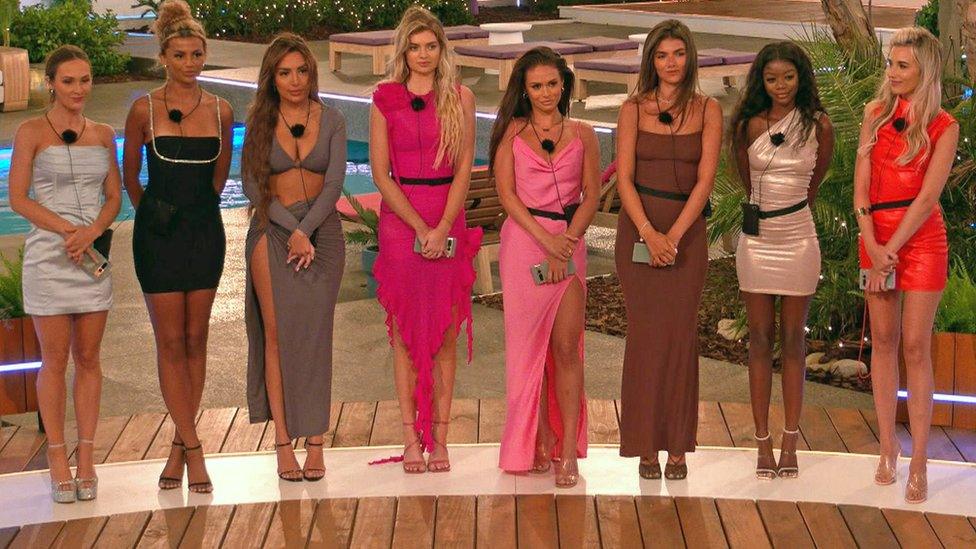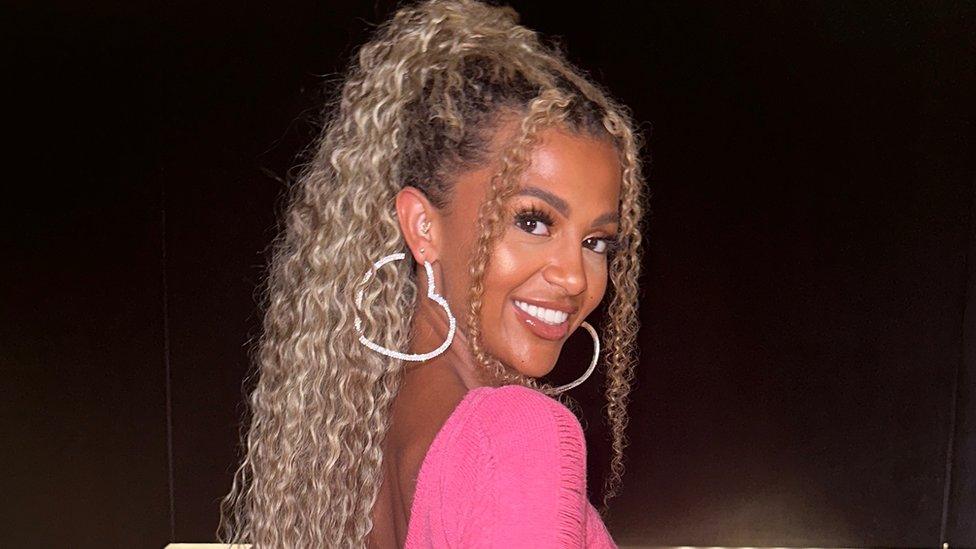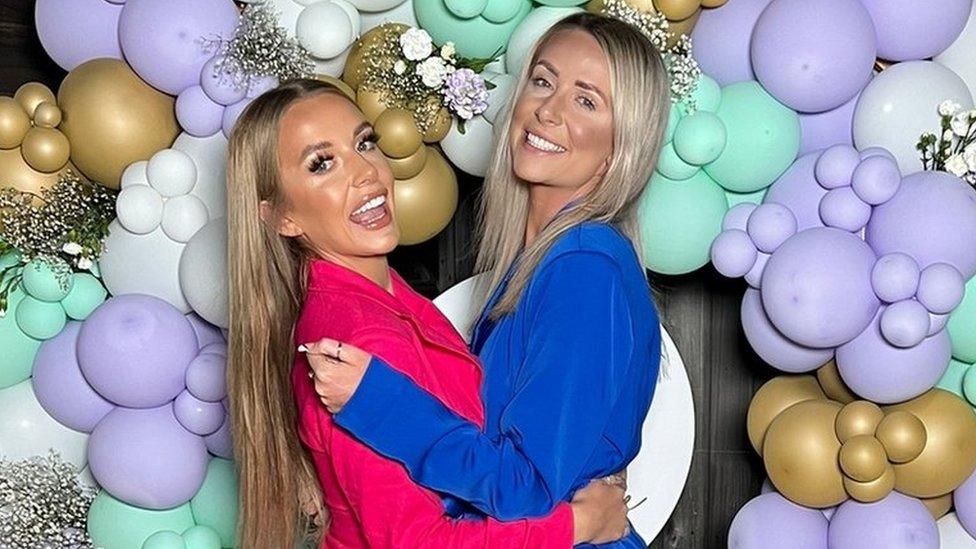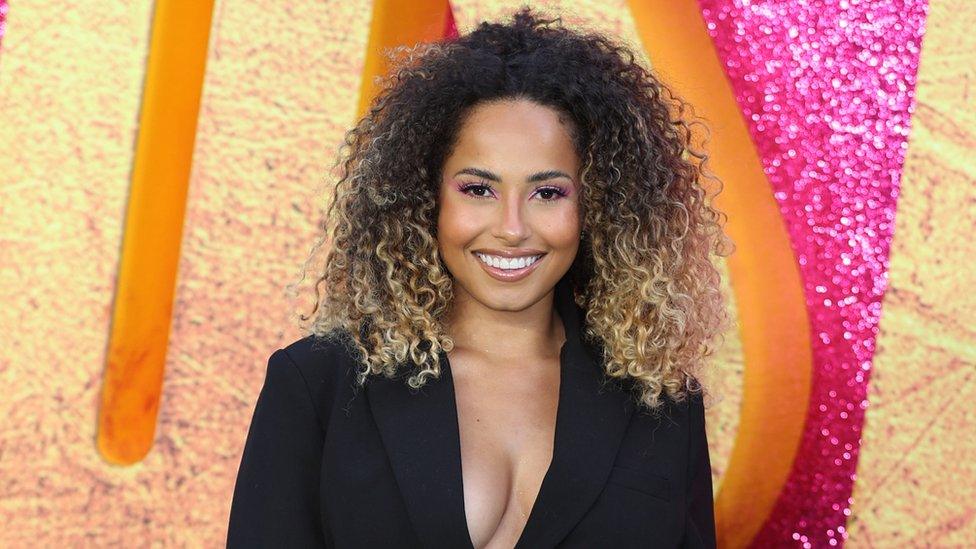Love Island final: Has the social media ban been good for contestants?
- Published

Business as usual inside the Love Island villa, but there's been one big difference on the outside
The winners of winter Love Island 2023 have been revealed.
After eight weeks in South Africa, the public finally crowned Kai and Sanam, external as their favourite couple.
But those who made it to the final might be surprised when they come home - as they'll likely have fewer followers on social media than they expected.
Usually, by the end of the series, some islanders have already hit one million.
This year the islander with the biggest following is Jessie Wynter with just under 500,000 - but she'd already been on Love Island Australia.
Allow Instagram content?
This article contains content provided by Instagram. We ask for your permission before anything is loaded, as they may be using cookies and other technologies. You may want to read Meta’s Instagram cookie policy, external and privacy policy, external before accepting. To view this content choose ‘accept and continue’.
Obviously, the point of the show is to find love - not Instagram followers.
But, over the past nine series, appearing on the show has been a springboard to building a glamourous career.
That's going to be a lot trickier this year - and there's a reason why islanders aren't doing as well online.
As part of ITV's updated duty of care protocols, the broadcaster implemented a ban on islanders' friends and families using their accounts while they're on the show.
In previous series, contestants have had people posting daily on their Instagrams, sharing memes and, sometimes, responding to controversies with statements on their behalf.
ITV said the ban was to "protect both the Islanders and their families from the adverse effects of social media".
Dr Matthew Gould - who works on the show - said the ban showed ITV was serious about addressing "a potential source of mental health problems".
Since 2019 - and following the deaths of previous contestants Mike Thalassitis and Sophie Gradon - bosses have offered islanders at least eight therapy sessions after their time on the show.
Psychologist Jo Hemmings, who has worked behind the scenes on a variety of reality TV shows, told BBC Newsbeat in January that Love Island now has a "gold standard" when it comes to duty of care.

Zara entered the villa on day three, and left on day 16
But Zara Lackenby-Brown, who was in the villa this year, tells Newsbeat the ban didn't stop her family from seeing abuse directed towards her online.
She says people questioned her race, or speculated about her knowing fellow islander Olivia before both entered the villa.
"If people can't message your account, people are going to find another way," says Zara.
"They're going to make a TikTok video, they're going to make a YouTube video, they're going to make another account to talk about reactions," she says.
"My family definitely experienced the trolling towards me, regardless of whether my account was paused or not.
"And it's actually a shame. Because islanders' channels have previously been open, that's been a way for the friends and family to be able to have a voice.
"If there's a rumour going around, they could squish it immediately.
"But I think this year, it's almost like that voice was taken away from the friends and family."
Zara adds: "If anything, the social media ban has just stunted our social media growth."

Tanyel was in the villa for over three weeks
Tanyel Revan also appeared in the latest series, and tells Newsbeat she "understands [ITV's] approach" and that the ban probably helped families.
But, like Zara, she thinks people troll regardless, and that the ban should be optional.
"I would have said no, I don't need it, personally, and I would have said lift the ban," Tanyel says.
"But I do think health is so important. And if it's going to help people, then obviously keep it there."
As well as fewer followers on social media, there have been fewer people watching Love Island this year.
The opening episode reportedly had 1.2m TV viewers, down from 2.4m watching the first episode of 2022's summer edition.
That, PR expert Jennifer Hodgson explains, could be down to "Love Island fatigue", especially as there's been two series within a year.
She believes this, as well as the social media ban, means fewer people are following the islanders.
In it for love?
Fewer followers and smaller viewing figures raise a question - will people still want to appear on Love Island in future?
"For me, my main thing was going on for the experience more than anything," Tanyel says.
Zara says she knew about the social ban before appearing, but that it didn't deter her as she wanted to go on the show to try and find a connection.
But she thinks the ban will put some people off appearing on the programme.
"I actually know one friend that got scouted, but she doesn't want to do it if it's going to continue because she just thinks that it's such a risk to go on," Zara says.
"Basically, your social channels have made no noise.
"So now you're a public figure, but you haven't really got a means of making any sort of income."
Newsbeat have asked ITV if the ban will continue in future series.


Follow Newsbeat on Twitter, external and YouTube, external.
Listen to Newsbeat live at 12:45 and 17:45 weekdays - or listen back here.
Related topics
- Published16 January 2023

- Published31 July 2022
